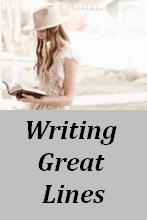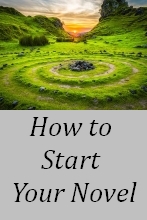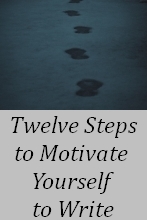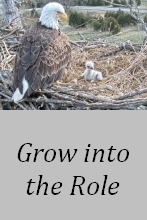Hook Readers Fast
By: Ken Brown
Published: 7/23/2021
Make Your Story have Action, Conflict and Problems from the Start
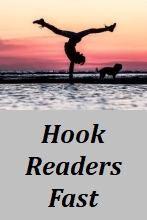
Where do you start your novel?
You might ask, "What do you mean, where do I start my story? I start it at the beginning."
"Yeah, yeah, I know that, but how much back story, character history, world building and things you researched about your novel do you feel you have to share with your readers in the first fifty pages?"
"Why do you ask?"
"Because you're doing it wrong."
"I oughta beat you up. I've been writing for years and my readers love me."
"Well I disagree. Let me tell you about the novel I'm reading right now."
I'm reading a space novel, it doesn't matter its name or the author's name. The characters are getting ready to go to Sirius, a star listed as 8.611 light years away from Earth. I've read at least fifty pages and nothing has happened yet. I've found out there was a war against aliens, Earthlings were saved by other aliens, there's a spaceship going to Sirius, I know the commander of the space ship, I know her father and mother. I know who the chef is. Oh yeah and there's another special alien race that I just found out about. The space ship just got out of blah, blah, blah . . . .
I just gave you one paragraph and you're bored aren't you? I don't know if I'll finish the novel. I didn't spend much for it, so I don't feel I have to finish it.
What Should You Do? How do You Write an Opening Scene and not Lose Readers?
Imagine if Star Wars had started with an introduction to Luke Skywalker as he is fixing fences out in the desert on his home planet?
Maybe he discusses world events with his uncle or they just talk about the local politics or Aunt Marie's festering leg sore.
BORING
No, the movie starts with a space battle. A princess is under attack. She sends off a rescue beacon with a funny looking droid named R2D2 with a robot sidekick with severe personal problems. The chief antagonist, Darth Vader, enters the spaceship and confronts Princess Leia. Wow, we have a bad guy and a woman with a goal to save her people.
We don't get backstory. Why do you think Lucas produced the fourth story, A New Hope, first? It's because that had the most exciting beginning. And he was right. It was after he produced films four through six that he felt comfortable giving us all the boring backstories found in films one through three.
Writing coaches tell you to start your story "In Media Res." Which translates to starting in the midst of something exciting. Who's your protaganist, your central point of view (POV) character? What does she want? What or who is preventing her from getting what she wants? What just happened in the story that will cause her life to change?
Is all Change Bad?
Sure most stories begin with something bad happening, a conflict, a decision to be made, but a good story can also have good change. What if our POV character is getting married. She accepted the proposal and now must plan a wedding. There's plenty of conflict in weddings and most readers think that weddings are pretty good experiences.
Maybe your story takes us inside the struggles an athlete experiences at the Olympic games. Wow, being on the Olympic team has to be the best moment in a person's life, yet, we know our athlete will have difficulties at the Olympic village. Maybe the food is bad or unhealthy. They don't speak the language or our Olympian gets lost during a self-guided tour of the city, ending up threatened by hostile locals or going the whole day without water. What if the athlete loses their passport or Olympic Village pass and they have trouble getting back into the Olympic village. What happens if their training schedule gets interrupted and they feel the effects of jet-lag?
Upset the Status Quo
I recommend writers start with something early that upsets the staus quo. That conflict may be work issues, a death in the family, a murder if you write a detective series, a fight with your spouse or sibling or a dragon flying into town and burning the town hall. Get us into the story fast. Then weave back story, relationships with other characters, landscape and weather into the chapter as the POV tries to solve the immediate problems presented to her.
Sure we want your fantasy story to be rich in description, but something has to be happening in the story. Is your POV scared or worried about meeting a boy that she likes? What will she say to him, is her hair okay or is there some reason she didn't have time to brush her hair or her head is soaked from the thunderstorm she had to walk through to get to the magic shop?
Biggest Takeaway
Make something happen in your story early. Don't begin with paragraphs and paragraphs explaining the culture, the history or the relationships between people. Start with action, conflict and problems, then intersperse the culture naturally as the story grows.
Photo by Jonathon Macedo on Unsplash.
